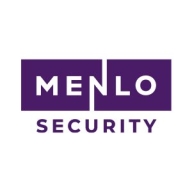


Menlo Secure and Huawei NGFW are both leading security products. Users tend to prefer Menlo Secure for its cost-effectiveness, while Huawei NGFW is considered superior due to its robust features.
Features: Menlo Secure is noted for its advanced threat detection, easy integration, and competitive pricing. Huawei NGFW includes comprehensive security functionalities, intrusion detection, and extensive features. Users generally find Huawei NGFW's features more detailed compared to Menlo Secure.
Room for Improvement: Menlo Secure could benefit from enhanced reporting capabilities, more granular policy controls, and improved documentation. Huawei NGFW needs better documentation, streamlined updates, and improved user resources. Menlo Secure requires developments in reporting, whereas Huawei NGFW needs improvement in user resources and update processes.
Ease of Deployment and Customer Service: Menlo Secure is appreciated for its swift and hassle-free deployment alongside responsive customer service. Huawei NGFW, although offering substantial support, sometimes faces criticism for its deployment complexity. Menlo Secure has a clear edge in deployment simplicity and support responsiveness over Huawei NGFW.
Pricing and ROI: Menlo Secure's setup costs are generally lower, and users report higher ROI satisfaction. Huawei NGFW, while more expensive initially, is deemed worth the investment due to its advanced feature set. Menlo Secure excels in affordability and return on investment, whereas Huawei NGFW justifies its higher cost with superior features.
| Product | Market Share (%) |
|---|---|
| Fortinet FortiGate | 18.8% |
| Huawei NGFW | 1.0% |
| Menlo Secure | 0.1% |
| Other | 80.1% |

| Company Size | Count |
|---|---|
| Small Business | 357 |
| Midsize Enterprise | 133 |
| Large Enterprise | 188 |
| Company Size | Count |
|---|---|
| Small Business | 10 |
| Midsize Enterprise | 6 |
| Large Enterprise | 7 |
Fortinet FortiGate is a versatile network security tool offering features like VPN, firewall, web filtering, intrusion prevention, and scalability. It is known for its performance and integration with other Fortinet products, making it a preferred choice for robust cybersecurity.
Fortinet FortiGate stands out as a comprehensive cybersecurity solution with strong performance and ease of configuration. It delivers unified threat management, integrating features such as dynamic routing, SD-WAN support, and centralized management. Despite its strengths, improvements in the web interface's stability, pricing structures, and reporting capabilities are needed. Users seek better integration with third-party tools and automation advancements to enhance the experience further. These enhancements, alongside improvements in bandwidth management and the reduction of licensing costs, are points of interest for users looking to capitalize on FortiGate's extensive capabilities.
What are Fortinet FortiGate's key features?Fortinet FortiGate is widely implemented across industries as a primary firewall system for securing internet gateways and safeguarding data centers. It supports businesses in achieving SD-WAN integration and enhances cybersecurity by providing essential features like antivirus, web filtering, and application control. Enterprises utilize FortiGate for securing remote connections and ensuring compliance with security standards, making it adaptable for different network sizes and industries.
Huawei's Next-Generation Firewall (NGFW) is a cutting-edge security solution designed to protect networks from advanced threats. With its advanced threat detection and prevention capabilities, the Huawei NGFW ensures the highest level of network security.
The product offers comprehensive security features, including intrusion prevention, application control, and URL filtering, to safeguard against a wide range of cyber threats. The NGFW also provides deep packet inspection and advanced threat intelligence, enabling real-time threat detection and response.
With its high-performance architecture, the Huawei NGFW delivers fast and efficient security without compromising network performance. It is easy to deploy and manage, thanks to its intuitive user interface and centralized management platform.
The NGFW also supports flexible deployment options, including virtualization and cloud integration, making it suitable for various network environments.
Menlo Security Secure Application Access
Menlo Security Secure Application Access makes zero trust access easy, giving users secure connectivity to private applications, including web and legacy applications. At the core of Secure Application Access is the Menlo Secure Cloud Browser, which fetches, secures and delivers the content for users.
In addition to providing simple-to-deploy, clientless ZTA, Secure Application Access and the Menlo Secure Cloud Browser protect applications from attacks such as session hijacking, cookie manipulation, and other tactics that employ protocol manipulation.
Secure Application Access protects applications from Internet threats and provides granular controls for added protection of the application and associated data. These security controls include Read-only/Read-write, Upload/download, Copy/paste, AV scanning, Sandboxing, and Data Loss Prevention.
Last Mile Data Protection
Menlo Last-Mile Data Protection identifies and prevents sensitive data from leaving your company by meticulously inspecting all file uploads and user input across browsing sessions. Leveraging the Secure Cloud Browser, users are protected from the internet and you can protect your organization from data loss with comprehensive traffic monitoring and controls. This approach addresses the growing concerns surrounding data leakage in the age of AI tools like ChatGPT.
By identifying sensitive data through file types, regular expressions, or predefined libraries, Menlo Last-Mile Data Protection empowers security teams to regulate data input into AI platforms and prevent unauthorized uploads. This capability provides crucial protection for intellectual property, PII, and other confidential information.
The solution leverages the Menlo Cloud Security Platform's visibility and control over traffic to reliably detect and prevent data leaks originating from both browser submission forms and non-browser traffic. With the ability to inspect encrypted web traffic, Menlo Last-Mile Data Protection enforces DLP policies consistently across all users and devices, ensuring comprehensive data protection.
We monitor all Firewalls reviews to prevent fraudulent reviews and keep review quality high. We do not post reviews by company employees or direct competitors. We validate each review for authenticity via cross-reference with LinkedIn, and personal follow-up with the reviewer when necessary.